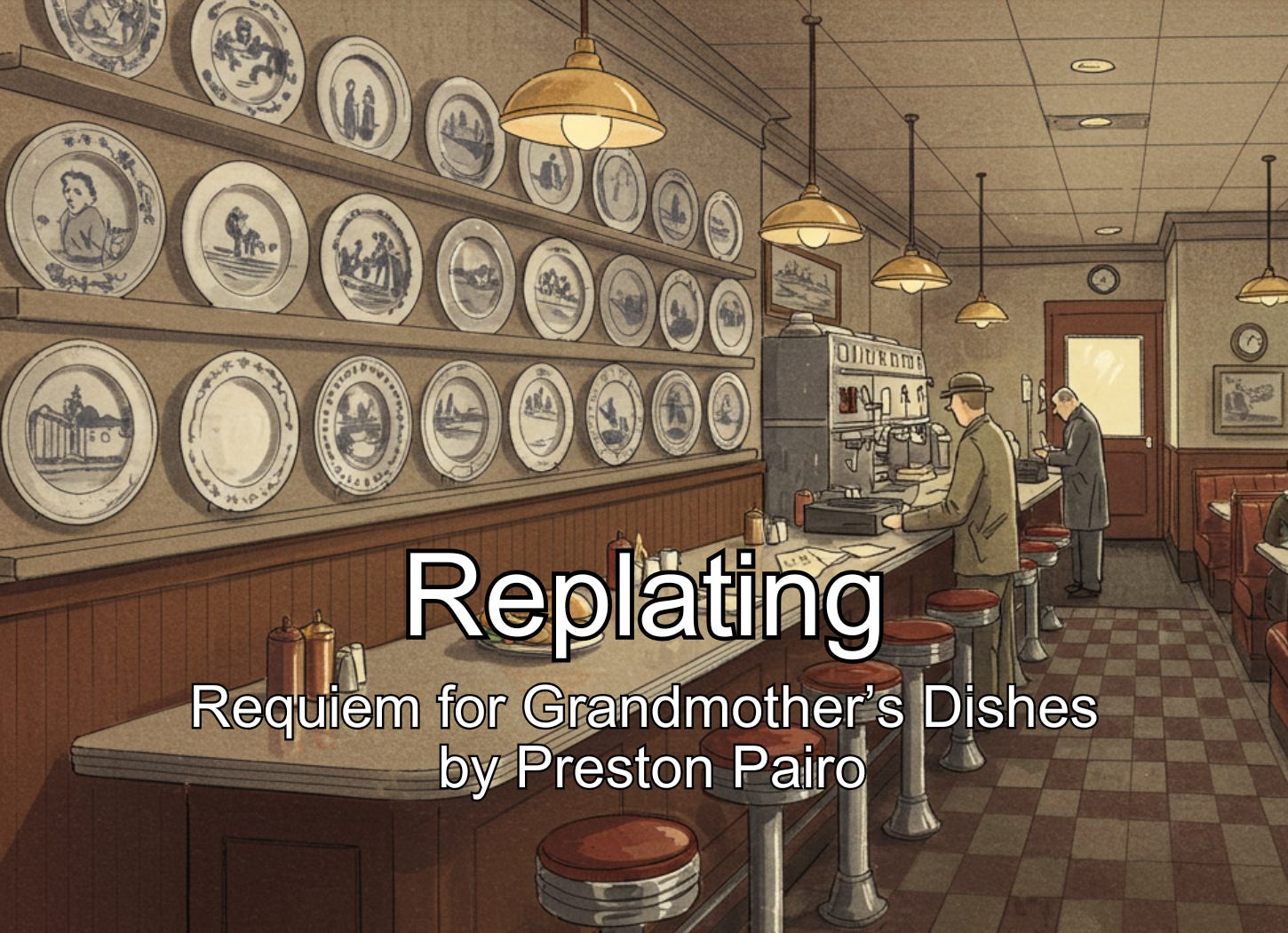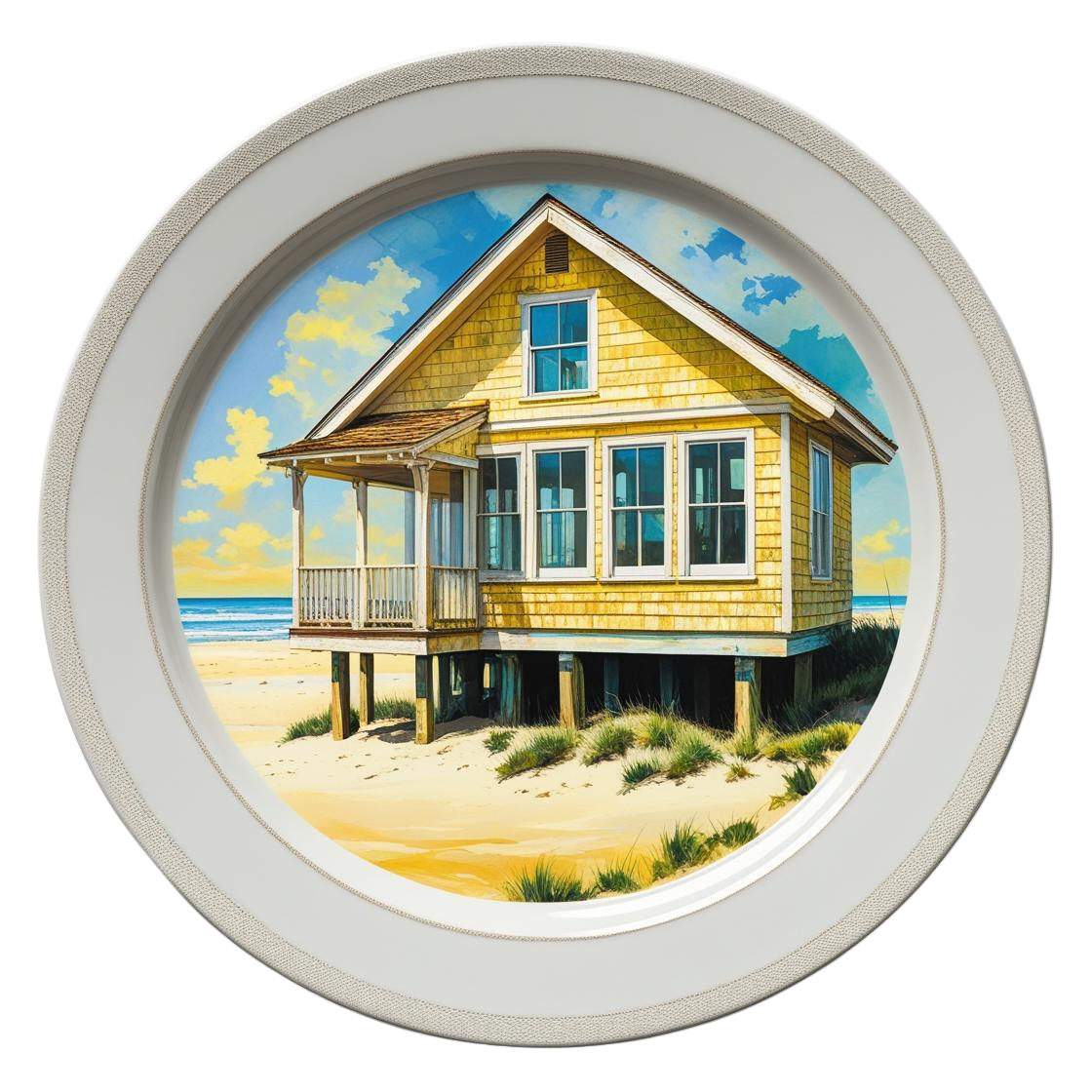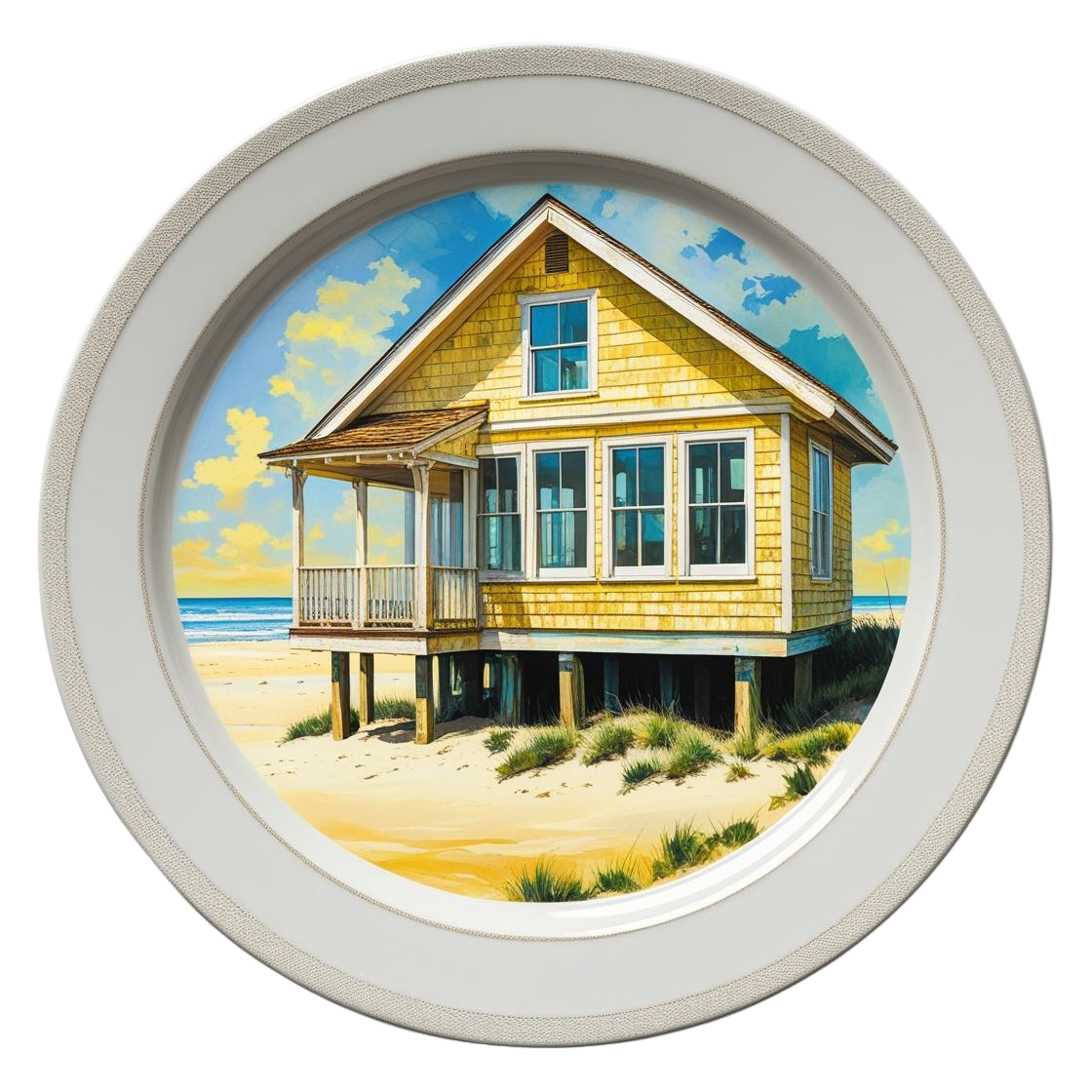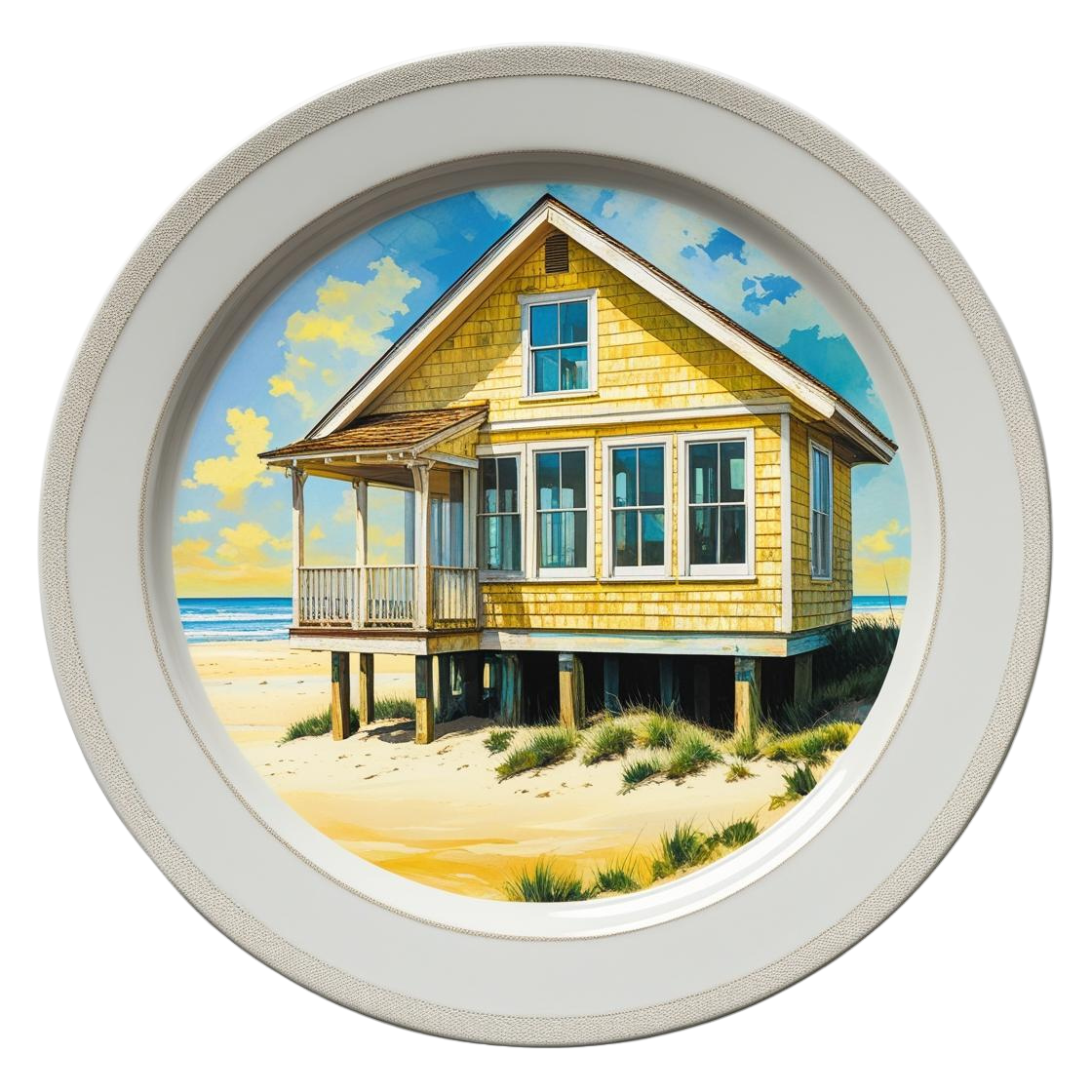Replating
Requiem for Grandmother's Dishes
This is a work of fiction. Names, characters, places, and incidents are products of the author’s imagination or are used fictitiously and are not to be construed as real. Any resemblance to actual events, locales, organizations, or persons, living or dead, is entirely coincidental. Copyright ©2025 Preston Pairo.
In standard book form, this story would be approximately 12 pages long.
“Oh, I’m so depressed.” Lotti drops her forehead onto the formica tabletop with a gentle thud that’s still forceful enough to rattle the long spoon her dear friend Clara left in her glass of iced tea (which Clara knows isn’t good manners, and is one of those marital habits that annoys her husband, Stirling, but she gets a pass here in the Boomer Falls Diner when she’s out for lunch with the girls (who call themselves girls although they haven’t fit into that loosely defined category for … well let’s just say a lot of Presidents have come and gone from the White House since they were actually girls.))
“What’s wrong, honey?” Clara asks.
“Shopping with Izzy,” Lotti groans. Her forehead remains on the table, where tiny grains of sugar stick to her skin, likely from Clara going a little hog wild with the sugar shaker.
“Oh, shopping,” comments Lucy, pleased the conversation has tracked to one of her favorite subjects, unlike theatre, which is what she and Clara were talking about before Lotti arrived. “Clothes shopping? Grocery? Car? Furniture?” Lucy asks as if it could possibly matter because she likes them all.
“Housewares,” Lotti replies. “If that’s what they still call plates, dishes, small appliances, that sort of thing…”
“Those are all good,” Lucy approves.
“Not all,” Lotti replies as she raises her head off the table. “In fact, mine are apparently … what was the word Izzy used…? Unliveable.”
“Is that really a word?” Lucy wonders.
“Yes,” advises Clara, who used to be an English teacher. “But an appliance can’t be liveable or unliveable, strictly speaking, because you can’t live or not live inside of an appliance.”
“I don’t think she was strictly speaking,” Lotti says of her daughter. “More like, ‘Mom, how can you live with plates like that?’
Lucy says, “I have friends who say that about my husband. Oh, yeah, it’s you two.”
“What doesn’t Isabelle like about your plates?” Clara asks between sips of sweet tea drawn through a paper straw. One of the best things about this old diner is the paper straws, which she imagines Omar Sr., father of current owner Omar Jr., must have bought by the railroad carload back in the ‘70’s.
“Well, not my plates specifically,” Lotti says. “But my grandmother’s plates. And my Aunt Bess’ plates.”
“All unliveable?” Lucy questions. “How did they ever manage to draw breath, I wonder—until … how old was your grandmother when she departed?” When she was younger, Lucy would have said died but now prefers departed because it sounds as if someone boarded a flight to the hereafter and didn’t keel over.
“Grandmother Jones was ninety-three,” Lotti informs. “And lived by herself for almost twenty years after Grandfather Jones died. And never once considered assisted living, although we all called it the ‘old folks home’ back then. Unlike my mother, who would have moved into assisted living when she was forty if she could have.”
“Be happy she’s happy there,” Clara consoles.
“For what it costs she should be. If she lived on a cruise ship it would be cheaper.”
“What happened to shopping?” Lucy asks.
“Well,” Lotti recounts, “Isabelle called last night and we’re talking, and she says they need new dinner plates. And I said, why doesn’t she come over and take Grandmother Jones’ plates, which are beautiful, and just sitting in a box in the basement, and we’re never going to use them, because we’re never going to have a second home at the beach.”
“What’s one have to do with the other?” Lucy wants to know.
“If we got the second home at the beach, we could use the plates there.”
“Why would you want another home at the beach?” Clara asks.
“What are you talking about? We don’t have a home at the beach.”
“From where we’re sitting, you can get to the beach in an hour. Less than that if Frank is driving,” she adds and gives Lucy a reproachful look about her heavy-footed husband. “And I know lots of people who say they have a beach house who need at least an hour to get to any actual waterfront.”
“Beach-ish I think they mean,” Lucy says. “Beachal.”
“Now beachal is definitely not a word,” Clara schools, then asks Lotti, “And this is what has you feeling blue? You got your feelings hurt because Isabelle doesn’t want your grandmother’s plates?”
“It’s not my feelings, it’s the hypocrisy. I’ve raised a daughter who lectures me on recycling but thinks nothing whatever of the natural resources consumed to manufacture, ship, store, and sell eight place settings—not to mention whatever she spends for it—when a box of wonderful dishes—and a dozen place settings by the way—are collecting dust in my basement. And: she could have them for free.”
Lucy is not convinced. “Personal style is very important. You should be proud to have a stylish daughter.”
“The other week,” Lotti describes, “she took me to that ridiculous grocery store that sells the thirty-dollar smoothies … and in their café, there’s an app for the recycling bins. There are so many different bins, you need an app to tell you what to put where. It took longer to throw away what was left of lunch than to eat it. And Izzy was determined we get it right. But heaven forbid she uses Grandmother Jones’ unliveable plates instead of buying new.”
Lucy leans forward and whispers, “Well, don’t tell anyone—”
Clara interrupts, “Who am I going to tell? My friends are all here.” She uses her finger to draw an imaginary circle around their booth.
“You have other friends,” Lotti is quick to point out.
“Acquaintances,” Clara counters.
Lucy gets on with her secret, admitting in a hush: “We don’t recycle anymore. Frank and me.”
“And I,” Clara reflexively corrects.
“Ever since we went to Paris last summer,” Lucy shares covertly, “and Frank saw all the garbage piled on the sidewalks… He called it French recycling.”
“Tell me Frank isn’t dumping your recyclables in the street,” Lotti hopes.
“No—just puts it in the can with the rest of the garbage. Which I rather saw coming. And don’t actually think had anything to do with the French … how whenever he used to read a news story that aggravated him, he’d say, ‘I’m saving the planet for this bunch?’”
Lotti sighs, “The world is such a mess.”
Clara shrugs, unconcerned, and takes pleasure in another sip of iced tea through one of those wonderful paper straws. She is about to tell Omar Jr. (again) how much she likes them.
The handsome young owner (much better-looking than his father (may he rest in peace)) is approaching their booth, a hospitable smile on his face (unlike his father, who’s default expression had been a scowl as if coming to collect money he was owed). Only Omar Jr.’s happy demeanor is abruptly erased by a loud crash near the kitchen door, followed by an expletive barked in Greek, and an ensuing smash, clatter, and clang of falling serving trays, glassware, dishes, utensils, and food that instead of being expedited to someone’s table will require a mop and bucket.
“Don’t say a word,” the three friends overhear Omar Jr. remind himself. “Don’t say a word. You can’t yell at them, or they’ll quit. You can’t deduct the cost of the broken glasses from their wages like papa used to.” His hands make a motion as if smoothing a tablecloth. “Just clean it up … and move on.”
Clara consoles him, “Very wise, Omar.”
“I hate this business,” he admits.
“Don’t say that,” the three friends admonish to varying degrees and in turn.
“No,” Omar Jr. declares firmly. “The way it is now. Since Covid—all those years ago. I hate it. Everything is so expensive. More and more and more every month. The food. The supplies. The wages. I have to increase menu prices—and who gets blamed for that? Not Covid. Me.”
“We never complain about the prices,” Clara assures him.
“No. I know. You girls are wonderful.”
Lucy likes that he calls them girls without being condescending, which reminds her of when the three of them sat in this diner as teenagers, drinking coffee like adults back before Starbucks et al. lured youngsters into the world of caffeine with sugary concoctions. Often during their high school years, when they snuck off to this diner, they were supposed to be at the library working on a “research paper” (or so they told their parents, who always fell for that, except Lucy’s mother who used to wink whenever she asked Lucy how that “research paper was coming?”)
Omar Jr. tells them, “When I was a boy, and washed dishes here for my father, one of these…?” He picks up a plain white dinner plate. “…twenty-five cents. Now: five dollars. From the beginning of time—beginning of time—until I was a boy, the cost of this plate goes up to twenty-five cents. Now: five dollars. Centuries it takes to cost as much as twenty-five cents. The next fifty years it goes up to five dollars. Where does it stop?”
“I don’t think it does,” Clara sympathizes.
Examining her own plate, Lotti asks Omar Jr., “How committed are you to this pattern?”
“I guess we’re not getting that beach house,” Augustus says to Lotti as he loads the second box into the trunk of the Volkswagen GTI.
The zippy hatchback is Lotti’s car. Glossy red and fast off the line. “Torquey” her fellow car-enthusiast nephew calls it. A very ungrandmotherly car.
In another life, Lotti would have been a sprint car driver. Or ridden motorcycles, like that “dreadful boy” (Lotti’s mother’s phrase) Lotti dated in high school and then off and on again during her first two years away at college, who she “thankfully finally grew out of” (again, Lotti’s mother’s phrase) when she met Augustus, who was so “steady and handsome and smart” (yes, that’s Lotti’s mother’s appraisal again, although Lotti feels that way about him, too).
For Lotti, Augustus was not love at first sight, although she will say he was because that makes the story better, more well balanced, more symmetrical. Now though, she is most definitely deeply in love with Augustus and has been for over 40 years. But it is not like it was with that dreadful boy on the motorcycle, which was a relationship flush with the magnetism that is only possible with youth, or so Lotti tells herself, although she can’t help wondering from time to time what it would have been like had she gone down that very different path—one wild with imagined adventure that likely would have proven as tragic as it was thrilling, because life just isn’t built to sustain those sorts of moments … is it?
Which is why, provided her reflexes remain sharp, she has a GTI and takes corners too fast, which causes her to get dinged on the surveillance app they’ve agreed to let State Farm use to calculate their auto policy discounts—of which her savings are miniscule compared to Augustus, because the device kept in her car disapproves not just of her cornering, but her acceleration, speeding, and abrupt stopping—objections almost as strong as her mother’s feelings used to be for that boy on the motorcycle.
Unlike Lotti’s mother, however, Augustus doesn’t say a word about her chastising scores from the insurance app. He enjoys the way she drives and often prefers riding around in her hot hatch as opposed to his BMW sedan—a vehicle which cost almost three times as much as the GTI and could probably smoke her red car in a drag race, not that you’d ever know from how he drives it.
“If we do get a beach house,” Lotti says, replying to her kind husband’s teasing remark once thoughts of the motorcycle boy have played quickly through her head (as they’re sometimes want to do), “I’ll go shopping with Izzy and buy us some new ones.”
“Sounds like a plan.” Augustus smiles, getting into the passenger seat.
Twenty minutes later, they’re at the Boomer Falls Diner, pulled around to the back where the Sysco truck is making a delivery. Omar Jr. is already outside in warm sunshine, frowning at paperwork the food delivery man just handed him, waving the pages at Lotti and complaining, “Prices went up again.”
“We’ve come to the rescue, Young Omar,” Lotti declares, out of her car more quickly than Augustus, who is showing the beginning signs of moving like an old man, as if his days of quick motion are closed in chapters already lived.
Lotti fobs open her hatchback, and Augustus lifts out the first of two boxes, the heft of which causes his arms to strain slightly, which Lotti figures is good for him.
As Augustus holds the box in a moment of spontaneous isometrics, Lotti unfolds the flaps and Omar Jr. peeks in at the contents.
“Aren’t they lovely,” he appreciates. “Are you sure you don’t want these?”
Augustus says, “We’ve never going to get that beach house.”
Before Omar can question whether Lotti’s husband may have misheard him, Lotti says: “I’ll be happy to see them put to use. My Aunt Bess always loved this diner.”
“Well, I will use them,” Omar promises brightly. “I can’t wait to see what people think.” And with that, he relieves Augustus of the box of Aunt Bess’ circa 1950 aqua dinner plates with the midnight-blue crinoline ripple edges, matching salad plates, bowls, cups, and saucers.
He is even more charmed by Grandmother Jones’ Currier & Ives “Royal Ironstone” place settings, with the blue-tone rural homestead scene centered inside an etched rim with scrolled adornments.
“You know,” Lotti suggests to Omar Jr., “maybe that reporter who has lunch in here sometimes—the one who does the human-interest stories? If you serve her next lunch on one of these plates and tell her how unwanted dishes are being given a new life, she might put you in the paper. Get you some free advertising. Maybe other people will bring you their old plates. Call it housewares recycling. Just don’t mention where these came from,” she says of her inaugural contribution.
Omar Jr. thinks this is a marvelous idea and takes the remaining box from the truck.
Augustus, on the other hand, considers his pretty wife and tells her, “I feel like you’re up to something.”
“Just clearing out the basement,” Lotti defends.
“Goodwill didn’t want the plates you say?” Augustus questions.
“No one did.”
“Hm,” he considers.
“They’re old,” she points out.
“So are we.”
“You realize,” Lotti counters, “you’re making my point.”
Two weeks later, Lotti is having lunch with Isabelle, although not at that café in the grocery store with the oddly spelled name that considers the word “organic” as a license to charge three times as much as Safeway, which already isn’t a bargain.
Midway through their meal, Izzy says, “You know that crusty diner you’re always going to? You want to meet there tomorrow night for dinner? Jessie’s been showing me posts about people giving the diner their plates and wants me to take our old ones there.”
By her “old ones,” Lotti knows Isabelle is referring to the Williams and Sonoma set she bought a few years ago and replaced with what she picked up week before last at Arhaus. Lotti also suspects her oldest is aiming to take out multiple birds with one stone, appeasing her 15-year-old’s unfortunate habit of following trends and having a dinner with her parents that doesn’t involve her having to cook, which Izzy finds to be one of life’s many obligations instead of the pleasure Lotti considers it. Some traits skip a generation it appears.
Any disappointment this causes Lotti to feel, however, she will keep in reserve until she next sees the girls at the diner (which is not crusty, but lovely and characterful). She responds to her daughter’s invitation with a pleasant, “That sounds lovely, honey.”
The following evening, the weather is lovely indeed. An unseasonable cool spell in mid-August.
“Feels like a back-to-school night,” Augustus tells Lotti as he unwinds himself from the GTI’s sporty passenger seat. “Funny how all these years later to still think about going back to school when the first whiff of autumn hits.” They walk side by side, not holding hands but very close, and at the top of the diner’s three-step landing, Augustus opens the aluminium-framed door for her.
Inside, the restaurant buzzes with mealtime conversation and the clink-clank of cutlery against plates. It’s more crowded than usual and some of the waitstaff appear harried.
Omar Jr. is at his customary place at the register, which provides the same managerial vantage point from which his father oversaw this homespun gastronomical operation. He smiles at Lotti and Augustus and points them to the dining room, which his father had added onto the railroad-car-shaped diner four decades ago. “Your family is already here,” he says.
Lotti thanks him and leads the way along the checked tile floor between the counter and booths, through the low archway that would never pass modern-day building codes, because both Omar Sr. and the contractor who put on the addition were short.
At a round table, Isabelle is seated alongside husband Sam, one of those rare men who still wears a suit to work. Sam’s a senior aide to the county executive and (heaven help them) has political aspirations.
Also at the table is lovely 15-year-old Jessie with her head of sandy blonde curls Lotti used to run her hands through when the girl was little.
Jessie is posting pictures of a 30-yearish-old Mikasa dinner plate some couple probably received as a wedding gift. Her teenaged thumbs dash across her phone like a 1960’s beat writer on a deadline, giving all impression that the collective social media populus eagerly awaits her latest breath when, in actuality from Lotti’s point of view, that audience seems largely comprised of competing performers, quick to offer happy emoji responses in order to get on with digitally presenting a starry filtered version of their own lives. Or maybe, Lotti frequently considers, she’s just too old to get it. Maybe this is how the relevant generations best communicate.
At least word seems to have spread about the diner’s new “old” plates, what Lotti thought of as recycling, but the feature writer’s online article coined: “Replating.”
Jessie pockets her phone to give Lotti an enthusiastic hug, which warms Lotti’s soul unlike any other. Grandad gets a hug, too, and while it’s loving enough, it’s not like with Lotti. “Granly, aren’t these plates cool?” Jessie calls Lotti “Granly”, a made-up name that hangs on from Jessie’s mispronunciation when she was learning to talk.
Lotti is surprised to see a dozen different dishes displayed on a wood rail Omar Jr. has installed along one wall, showing off plates the way some diners hang logo caps or law enforcement badges. Who knew there was so much unused dinnerware relegated to basements and storage units?
“It’s so fun. Look at Huckleberry Hound.” Jessie points to the plate on the rail: a faded image of the smiling blue dog in his straw boater hat centered inside a plain circle of inexpensive porcelain.
There are other cartoons: Snoopy on patrol after the Red Baron, and the original Jetsons in their early 1960’s version of what futuristic kitchens would look like but never have. These comic strip drawings mix eclectically with more staid designs: Wedgewood Wild Strawberry with its delicate vines of berries tracing along the well and rim of the plate; a saucer shaped like an opened cabbage leaf embossed with white veins that Lotti imagines might be valuable.
“Grandma chic,” Isabelle says of the plates.
“Not like not-long-enough pants,” Jessie reminds Lotti, having cleared Granly’s closet of that fashion misstep months ago.
Lotti sits next to Jessie while Augustus settles alongside Izzy, who gives her father a peck on the cheek which silently reinforces her appreciation of shared secrets never revealed to Lotti: these are Izzy’s secrets—mostly her harmless youthful indiscretions Augustus said there hadn’t been any “need to fire up mother about.” If Isabelle ever happens to mention one of those incidents to her father now, he says he’s forgotten all about it, which Izzy knows is a white lie and just him trying to make her feel better about mistakes that luckily didn’t cause any problems in the long run.
Conversation among the three generations is easy and pleasant. Lotti and Sam veer off onto local politics with a unified point of view. Jessie goes back to her phone. Izzy makes a face when her father recites the tentative itinerary of the European trip Lotti is planning for the two of them and she quietly warns about one planned excursion: “Don’t let her take you there—you’ll wish you had daggers in your eyes.”
Augustus doesn’t know what that means but is thankful for the intel. Not that he’ll try to strike that stop off Lotti’s list, but he’ll remember to lessen his expectations.
Once their meals are served, they share the images their different plates reveal as they consume their food. While some dishes are plain bone china (although gravy from Augustus’ meat loaf runs over a gold rim), Jessie’s roasted vegetables hide a painted robin’s nest that holds a trio of blue eggs encircled by a delicate vine.
“Mom,” Jessie declares, her tone making clear humanity’s survival depends upon what she’s about to say, “we have to get plates like these. Old plates like this with a story. Think about who ate off these plates … like way back when Granly was a little girl.”
Lotti could have done without that age reference, but okay…
Isabelle laughs, “I’m not sure I want to think about who ate off these a hundred years ago.”
“That’s when I was little?” Lotti questions. “A hundred years ago?”
“You know what I mean,” Izzy teases, then tells her daughter: “We just got new plates.”
“Those are so factory,” Jessie groans with disapproval. “Sooo boring.”
Isabelle considers the confetti of tiny roses on her own dish, which if she turned over and Googled the marker’s mark she would discover was Royal Albert. “These are pretty.” She looks at her mother. “Maybe I’ll take you up on grandma’s plates.”
“Oh, I gave those away,” Lotti replies and makes it sound nonchalant.
Augustus is about to say one of those dishes might be here up on the wall but feels a firm nudge of his wife’s foot under the table he doesn’t think is coincidental.
Three hours later, Lotti and Augustus are in bed with their reading glasses on, both propped up by a sea of pillows.
Lotti is on her Kindle. Augustus is texting with his friend, Stirling, who suffers bouts of insomnia while his wife, Clara, sleeps like a happy child.
Stirling is often keen for distraction from what he calls the “evils that lurk in the night”, which Augustus appreciates to be old age’s version of monsters under the bed: that litany of everything that could possibly go very wrong that may not have gone wrong today but could have—and one day will.
His text sent to Stirling, Augustus lowers his phone and says to Lotti: “I knew you were up to something with those dishes you gave Omar.”
Lotti finishes reading a paragraph. “I was wondering if you were going to say something.”
“You’d think me senile if I didn’t catch it.”
“Mm.” Lotti sleeps her Kindle and removes her glasses.
“Mission accomplished then?” Augustus asks. “With the plates?”
“Not really.”
“Didn’t think so. Didn’t pick up any air of contentment from you.” Augustus tilts his head toward his wife. “What was the idea there, is what I can’t figure.”
“Oh, it’s pathetic,” Lotti sighs. “And it wasn’t like me at all.” Another sigh. “I just wanted Izzy to want those damned plates. I wanted her to value something that was valuable to me. I wanted to share those memories with her.”
“You could have told her that.”
“No.” Lotti shakes her head. “That’s like reminding a man to buy you flowers. It’s not the same unless it happens spontaneously.”
He leans closer and nudges her with his shoulder. “I buy you flowers ... spontaneously.”
“I know.”
“I’m well trained.”
“And I appreciate that.” Lotti kisses him, then sits back.
Augustus considers, “So … you gave the dishes away … and managed to create a scenario where Izzy decided she wanted them after all … only she learns she missed her chance…?”
“I’m not proud,” Lotti confesses.
“You should be. That was pretty involved mom stuff there. The odds of it working out.”
“But it didn’t work out. She found out I gave them away and could have cared less.”
“She didn’t seem especially upset,” Augustus says.
“Not in the least. She’s probably on Etsy buying mismatched old plates as we speak. From someone else’s grandmother. And now I’ll have to look at them whenever we go over there for dinner.” Lotti shakes her head and exhales a resigned, “Foo.”
“Magnificent effort, though. Of course, you could have mentioned the dishes to Allison,” he offers, referring to their younger daughter. “She probably would have taken them.”
Lotti shakes her head. “No… She’s already got Aunt Jenny’s dishes and all Bart’s parents’ stuff. What would she have done with them?”
Augustus shrugs.“You never know. One day they might get a beach house.”
Thanks for reading. If you’d like to get more free stories and be notified about my future books (maybe once a month), please enter your email below to subscribe (it’s free, and you can cancel anytime).








I like this a lot. The dialogue is very deftly controlled and you make the main voices clearly distnguishable.
Appreciate the kind words.